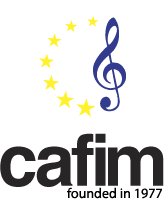Focus on China and Music Education
Delegates of the Confederation of European Music Industries (CAFIM) met in Paris
Main emphasis at the last delegates meeting attended by member associations of the Confederation of European Music Industries (CAFIM) held in Paris was on the reduction of Chinese import duties announced shortly before the meeting took place. President Antoine Beaussant and delegates assembled at the meeting warmly welcomed this step as a successful achievement resulting from continuous ongoing dialogue between representatives of the China Musical Instrument Association (CMIA) and CAFIM pursued in recent years. However, consensus prevailed that this could only be an initial move towards normalizing commercial relations and establishing fair trading conditions.
Im Fokus China und Musikerziehung
Delegierte der Konföderation der Europäischen Musikindustrien (CAFIM) tagten in Paris
Im Rahmen der letzten Delegiertenversammlung der Mitgliedsverbände des europäischen Verbandes der Musikwirtschaft (CAFIM) in Paris stand die kurz vorher bekannt gegebene Reduzierung der Einfuhrzölle Chinas im Blickpunkt. Präsident Antoine Beaussant und die Delegierten begrüßten diesen Schritt sehr, der als ein Erfolg des kontinuierlichen Dialogs zwischen den Vertretern des chinesischen Verbandes China Musical Instrument Association (CMIA) und CAFIM der letzten Jahre gewertet werden kann. Man war sich jedoch einig, dass dies lediglich ein erster Schritt zur Normalisierung der Handelsbeziehung und fairer Wettbewerbsbedingungen ist. Es muss daran gearbeitet werden, dass alle Musikinstrumente und deren Bestandteile sowie Zubehöre auf den erfreulich niedrigen Wert reduziert werden, wie es der freie Welthandel erfordert und durch die WTO definiert ist.
It was felt that efforts had to be made to ensure that duties on all musical instruments and appurtenant accessories were brought down to the low level stipulated by global free trade in line with the provisions laid down by the World Trade Organization (WTO).
In this context, the need was also expressed to sound out the actual size of the Chinese music market
IPR protection continues to assume growing importance in talks held with the Chinese Music Industry. This is endorsed by the fact that Chinese manufacturers themselves are meanwhile heavily affected so that sensitivity to this issue is becoming increasingly palpable.
This subject will be open for discussion at the Music China Expo due to take place in early October, the same applying to issues pertaining to certified logging of forestry produce, the avoidance of pollutants and the fixing of quality criteria for musical instruments.
The practice of origin-marking applied to musical instruments is showing results, this causing irritation not only in China and Europe, but elsewhere, as well. Regulation of this issue was considered to be in the interest of both markets and indeed on a global level.
What might possibly help in this respect is the “European Excellence” label, introduced by CAFIM back in 2006 or, for example, by propagating the Master Craftsman designation e.g. “Meister” and the “Made in Europe“ Certificate issued by the German Piano Manufacturers Association, further endorsed by the “Made in Germany“ quality attestation.
Issues pertaining to vocational training formed yet another item on the agenda.
In addition, it was regarded as important to set up a discussion group involving Chinese and European military band musicians.
Musical education continues to play a central role at all CAFIM delegates meetings, Paris proving no exception in that respect. Regrets were expressed at the restraint on musical education exercised at schools throughout Europe providing a general curriculum. The delegates intend to pull out all the stops in an effort to maintain the status quo, while aiming at appropriate expansion or a revival of musical education in school curricula.
Antoine Beaussant commented as follows: “The promotion of musical activity is of vast importance, not only to the Music Industry, but also to society as a whole both within and outside the EU – worldwide.” CAFIM members are in contact with representatives of the El Sistema musical education scheme that has come to enjoy conspicuous success in Venezuela and are exploring the scope of learning from this approach with a view to adopting certain features of this exceptional system.
The German “Music-in-the-Classroom” concept will be introduced to the Czech Ministry of Education in early October followed by a presentation of the scheme to colleagues of the China Musical Instrument Association and those involved in musical education at the German School in Shanghai.
The next meeting of CAFIM delegates with representatives of the Chinese Association CMIA will be held prior to the staging of the Music China Expo.
Further information may be had by contacting the CAFIM Head Office:
Confederation of European Music Industries (CAFIM)
Brunnenstr. 31, D-65191 Wiesbaden, Germany
mail[at]cafim.org, www.cafim.org

left to right
Claudio Formisano, Vice-president CAFIM, Delegate Italy
Antoine Beaussant, President CAFIM, Delegate France
Ivana Stolarova, Delegate Czech Republic

In the best of moods during the preliminary talks, the delegates of CAFIM, left to right
Emmanuel Tonnelier, France
Claudio Formisano, Vice-president CAFIM, Italy
Antoine Beaussant, President CAFIM, France
Ivana Stolarova, Czech RepublicStephen Wick, United Kingdom
Vaclav Hnilicka, Czech Republic
Gerhard A. Meinl, Germany
Winfried Baumbach, Secretary General CAFIM
In diesem Zusammenhang gilt es auch, die tatsächliche Größe des chinesischen Musikmarktes zu klären.
IPR-Protection spielt in den Gesprächen mit den Vertretern der chinesischen Musikwirtschaft eine immer größere Rolle, sind doch chinesische Produzenten mittlerweile selbst erheblich betroffen, so dass die Sensibilität für dieses Thema erfreulich zunimmt.
Im Rahmen der Anfang Oktober stattfindenden Music China wird darüber zu reden sein, wie auch über die Frage der Verwendung von Hölzern aus zertifiziertem Abbau, der Vermeidung von Schadstoffen und der Festlegung von Qualitätsmerkmalen für Musikinstrumente.
Die Ursprungskennzeichnung von Musikinstrumenten treibt Blüten, die zu Irritationen, nicht nur in China und Europa, führen. Ein Themenbereich, der von beiderseitigem bzw. allgemeinem Interesse ist und geregelt werden muss.
Hilfreich kann hier zum Beispiel das Label „European Excellence“ sein, das CAFIM bereits im Jahr 2006 vorgestellt hat, oder etwa der Titel: „Meister“ und das Zertifikat des Bundesverbandes Klavier e.V. „Certificate Made in Europe“ und „Certificate Made in Germany“.
Ferner stehen Fragen der Berufsausbildung auf der Agenda.
Des Weiteren gilt es, einen Gesprächskreis chinesischer und europäischer Militärmusiker einzurichten.
Musikerziehung spielt bei allen Delegiertenversammlungen der CAFIM eine zentrale Rolle, so auch in Paris. Bedauert wurde das Zurückdrängen der Musikerziehung an allgemein bildenden Schulen europaweit. Verstärkt werden sich die Delegierten für einen Erhalt des Status Quo und einen angemessenen Ausbau bzw. Erneuerung mit angemessener Berücksichtigung in den Lehrplänen der Schulen einsetzen.
Antoine Beaussant dazu: „Die Förderung des Musizierens ist allgemein von zentraler Bedeutung, nicht nur für die Musikinstrumentenindustrie, sondern für die gesamte Gesellschaft, innerhalb und außerhalb der EU respektive weltweit.“
Mit Vertretern von El Sistema, dem so erfolgreichen Musikerziehungsprogramm Venezuelas, stehen CAFIM-Mitglieder in Verbindung und prüfen, welche Möglichkeiten bestehen, davon zu lernen und evtl. Teile dieses so erfolgreichen Systems zu übernehmen.
Das deutsche System „KlassenMusizieren“ wird Anfang Oktober dem tschechischen Kultusministerium vorgestellt und in einer Präsentation an der deutschen Schule in Shanghai den Kollegen des chinesischen Musikinstrumentenverbandes sowie Vertretern der Musikerziehung.
Die nächste Sitzung der CAFIM-Delegierten mit den Vertretern des chinesischen Verbandes CMIA findet im Vorfeld der Music China statt.
Für weitere Informationen wenden Sie sich bitte an die Geschäftsstelle des Europäischen Verbandes
Confederation of European Music Industries (CAFIM)
Brunnenstr. 31, D-65191 Wiesbaden, Germany
mail[at]cafim.org, www.cafim.org

v.l.n.r.
Claudio Formisano, Vizepräsident CAFIM, Delegierter Italien
Antoine Beaussant, Präsident CAFIM, Delegierter Frankreich
Ivana Stolarova, Delegierte Tschechische Republik

Bestens gelaunt im Vorgespräch, die Delegierten der CAFIM, v.l.n.r.
Emmanuel Tonnelier, Frankreich
Claudio Formisano, Vizepräsident CAFIM, Italien
Antoine Beaussant, Präsident CAFIM, Frankreich
Ivana Stolarova, Tschechische Republik
Stephen Wick, England
Vaclav Hnilicka, Tschechische Republik
Gerhard A. Meinl, Deutschland
Winfried Baumbach, Generalsekretär CAFIM
